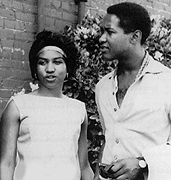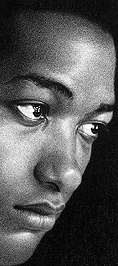![]()
1931 - 1964

Sam Cooke with Aretha Franklin
Sam Cooke was the son of a Baptist minister,
and was born on January 2, 1931, in Clarksdale, mississippi. Along with his seven brothers
and sisters, he grew up in Chicago singing in the choir at his father's church. When he
was only nine years old, Sam organized the Singing Children, a music group that included
one of his brothers and two of his sisters. The group sang at churches in the
neighbourhood.
Sam was always a good kid and a fine student, and he was deeply
committed to his religion. After graduating from high school, he sang for a short time
with Highway QC's, a gospel group. The quartet had heard about Sam, but they had never
heard him. Until one day, when the group was walking past Sam's house, they heard him
practicing. They knocked on his door and hired him on the spot.
Since he had been singing in churches most of his life, Sam jumped at
the chance to join the Soul Stirrers as their lead vocalist. The Soul Stirrers were a
popular gospel group that had been singing together since the 1930s. Nineteen-year ols Sam
was thrilled to replace the retiring star R.H. Harris and was soon in the groove of
touring the country and performing for large audiences.
During a gig at the Los Angeles Shrine Auditorium in 1957, a record
company executive noticed Sam's, clear voice and asked him to record a single. Sam was no
novice in the recording studio. He had already recorded several gospel hits with the Soul
Stirrers. But he was nervous about recording a secular song and wanted the Soul Stirrers
to know nothing about the record. Sam recorded the song under the name Dale Cook, but
despite his precautions, the Soul Stirrers found out that Sam had ventured out on his own.
They immediately found themselves a new lead singer, and Sam was out of a job.
Sam's single went nowhere. he was distraught but not because his song
flopped. He felt disloyal to gospel music. Producer bumps Blackwell spent months
attempting to sway Sam to give secular music one more try. Desperate and still out of
work, Cooke finally relented and recorded a tune he coauthoured with his brother L.C.
called "You Send me". It sold two and a half million copies for Keen Records.
The label only wanted to turn Sam into a black teen idol, but his talent
far exceeded their expectations. Recording For Keen Records, Sam had hits with all kinds
of music, including "Everybody Likes To Cha-Cha-Cha" (1959), "Only
Sixteen" (1959), and "Wonderful World" (1960). Cooke switched to a major
label, RCA Records, in 1960. He and Harry Belafonte were RCA's only black recording stars,
and the company had definate plans for the young performer. He was encouraged to add a
harder edge to his music and to be as soulful as he wanted to be. Sam had been pushing for
this direction because he still felt guilty about moving away from his gospel roots. The
swift rise of "Chain Gang" to the number two spot on the charts let Sam and RCA
know that the world really was ready for soul.
Sam's career shifted into high gear. He appeared frequently on network
television and played to capacity audiences in large arenas throughout the country. He
also became one of the first successful African/American record company executives,
organizing his own company, Sar/Derby, to develop black recording artists. While Sam
continued to record for RCA, he was producing "Lookin' for a love" by Bobby
Womack and the Valentines and "When a boy falls in Love" by Mel Carter. He also
gave such artists as Johnnie Taylor and Billy Preston their first recording contracts.
Sam's luck seemed to have run out in 1963. He was almost blinded in a
car accident that killed a close friend. Then his infant son drowned in a freak accident.
But worse was yet to come. No one could have predicted the events that took place on
December 11, 1964. Despite his being a major recording star and constantly being under the
watchful eye of the press, Sam maintained his clean-cut image, who had remained loyal to
his religious roots. Everyone's belief that Sam Cooke was practically a saint made the
events of that terrible night especially shocking.
The pieced together goes like this: Sam met a 22-year old woman at a
party. She says that he forced her to ride with him to a los Angeles motel. While Sam was
in the bathroom, the young woman ran off with his clothes. Clad in only a sports shirt and
shoes, Sam ran out of the room after her. He began pounding on the door of the motel
manager, who says he went berserk and broke down the door. The manager and Sam scuffled.
She grabbed her pistol and shot Sam three times. Unsure that he was dead, she beat the
wounded singer with a club. A coroners jury ruled that the motel's manager's actions were
justufiable homicide. Sam had not yet had his 30th birthday.
